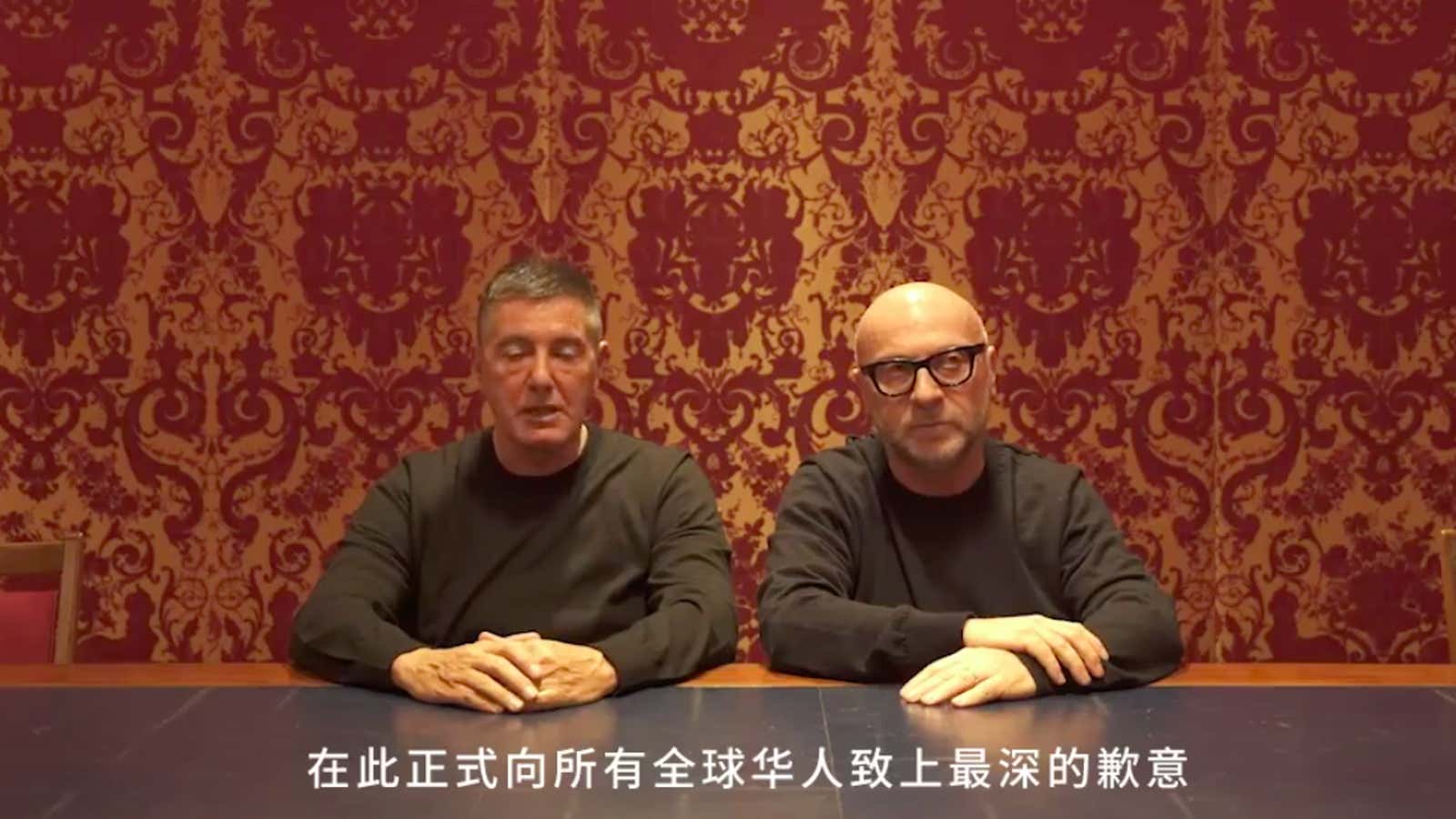The Italian luxury house Dolce & Gabbana has faced the full wrath of China’s internet users and fashion lovers this week, over a series of ads it posted to its social media accounts to promote a major fashion show in Shanghai slated for Nov. 21. Chinese citizens accused the ads of trafficking in racist and sexist stereotypes, stars backed out of the show in protest, and it was eventually canceled.
In a one-and-a-half-minute video (link in Chinese) posted to Chinese social network Weibo today (Nov. 23), the founders of the brand, Domenico Dolce and Stefano Gabbana apologized in Italian to Chinese people everywhere, ending with “sorry” in Mandarin:
In the past few days, we have deeply reflected upon the impact of our words and actions on China and its people, and we feel deep pain. Our families educated us to respect different cultures. As such, we hope that you will forgive our misunderstandings of (your) culture.
We take this occasion very seriously, and hereby officially issue our deepest apologies to all Chinese people in the world.
We have always loved China passionately, and our countless visits to China have made us love its culture even more. Of course, we still have much to learn. With regards to our earlier transgressions, we must apologize.
We absolutely will not forget the lessons of this experience, and such an incident will never happen again. At the same time, we must improve our efforts to understand and respect Chinese culture. Finally, from our deepest hearts, we ask for forgiveness from you.
Sorry. Duibuqi.
The ads in question depict a Chinese woman using chopsticks to eat pizza, spaghetti, and an oversized cannolo, a sweet ricotta-stuffed pastry. She awkwardly struggles at times, and in the cannolo video, the narrator asks the giggling actress in Chinese, “Is it too huge for you?”
Millions of people in China (and elsewhere) dissected and criticized the ads, and the situation quickly escalated even though the company deleted them from Weibo a day after posting them.
On Instagram, an argument started between Gabbana’s verified Instagram account, @stefanogabbana, and the user @michaelatranova about the perceived racism of the ads. At first, @stefanogabbana defends the ads, arguing that if people have an issue with them, it’s their problem. Then @stefanogabbana says that Chinese people eat dogs, before going on to use the smiling poop emoji to describe how he’ll refer to China from here on. “China Ignorant Dirty Smelling Mafia,” one @stefanogabbana post says.
Later Gabbana posted a screenshot of the conversation with the words “NOT ME” emblazoned across it, and said in the caption that his account had been hacked. But by then people on China’s Weibo social media platform were commenting with hashtags that translated to “D&G get out of China,” celebrities and models were abandoning the show, and at one point even the Communist Youth League weighed in, warning the brand to “respect Chinese people.”
Today’s apology came after the cross-cultural debacle cost the company not just the canceled show and its youthful brand ambassadors, but also its placement on important e-commerce sites serving the Chinese luxury market, which accounts for a third of all luxury spending, with the help of its millennials.
On Thursday (Nov. 22) Women’s Wear Daily reported Yoox Net-a-porter, the world’s biggest online luxury retailer, whose parent company just this month announced it had partnered with Chinese e-commerce giant Alibaba, would remove the brand from its fashion sites Net-a-Porter, Mr Porter and Yoox.com. The brand also couldn’t be found on Chinese e-commerce sites this week. And on Friday upscale department store chain Lane Crawford told WWD it wouldn’t stock Dolce & Gabbana merchandise. Alibaba and Yoox Net-a-Porter didn’t immediately respond to requests to confirm they had pulled the merchandise.
The Dolce & Gabbana backlash isn’t the first time a foreign company has found its foray into China requires knowing how quickly to apologize. Comments on Friday on @stefanogabbana suggest many are not convinced the brand is sorry enough.
